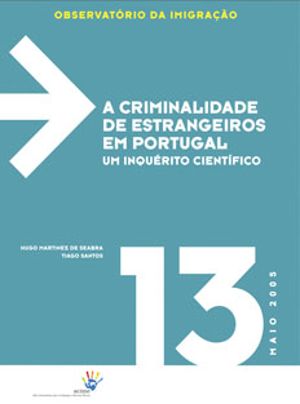A criminalidade de estrangeiros em Portugal: um inquérito científico
Documents
A Criminalidade de Estrangeiros em Portugal
Is the confirmed participation of individuals of a foreign nationality in criminal acts greater than their proportion in Portuguese society as a whole? The answer is as self-evident as it is misleading. In this formulation the question compares what is not comparable, that is, there is no constant when dealing with the criminality of Portuguese and foreigners. Foreigners and Portuguese resident in Portugal are very different from each other. What would be the result of this comparison were foreigners and Portuguese to be similar in features connected with criminal activity, namely those concerning their participation in the social structure? This was our true starting point and also, we believe, the only one that could clarify if there really was a contributing factor of nationality regarding criminality. Seeking an answer to this question, our concern was to gather quantitative data that would enable us to place both the foreigner and the criminal within the social structure. We found this mainly in the 2001 census and in data supplied by the Office of Legislative and Planning Policy of the Ministry of Justice (GPLP).
Only seven variables were present in both the GPLP and Census data: gender, age, nationality (reduced, due to the source, to a Portuguese/foreigner dichotomy), marital status, normal residence, education and work status. Of these, the lack of answers relating to education meant that this category could not be used, given that the information regarding this variable was only supplied in 61% of the GPLP cases; marital status had been collected in such a way as to make comparison ambiguous; and statistical confidentiality meant we could not work with normal residence, as this separated the data too much, and permitted the identification of individuals. We thus had the use of data relating to work, gender, age and nationality for the purposes of provided legal defence. In analysing the sentences awarded following a conviction, we can verify that foreigners are more frequently sentenced to prison, specifically with regard to actual time spent in prison. It is also relevant to separate the main crimes punished with this measure, with the crime of the trafficking of drugs being, in 2003, the reason for 47% of actual prison sentences given to foreigners and only 15% of Portuguese. If we take into consideration that the sentencing range of this crime goes from a minimum of four to a maximum of 25 years, rendering any other type of punishment as an alternative to actual imprisonment impossible, as this is only applicable for jail terms of up to three years.
We also verified that of the prison sentences given to foreigners, longer sentences predominate and that, with a notable frequency, the average length of prison terms awarded for the same type of crime are greater for foreigners. But this is a question which is being analysed a greater level of detail by other research currently being carried out, based on foreigners in the prison system.

